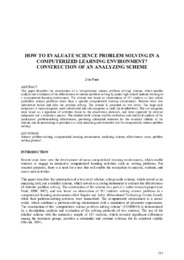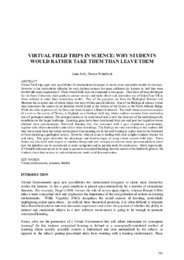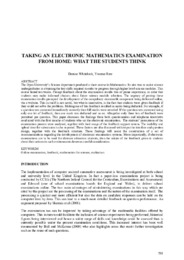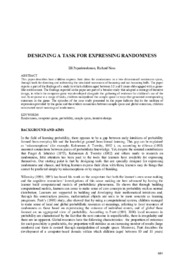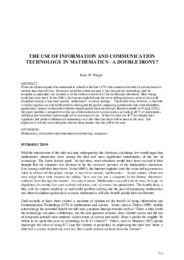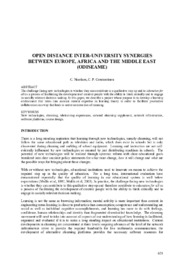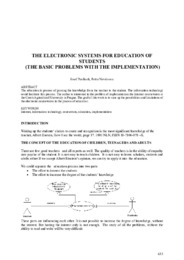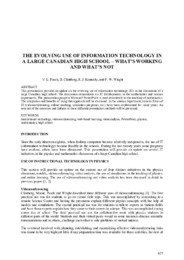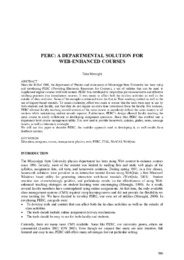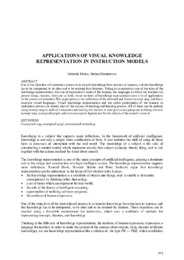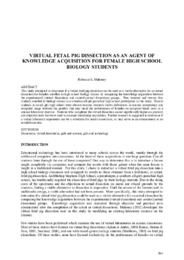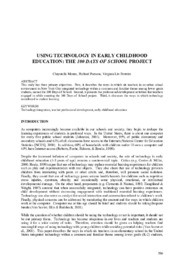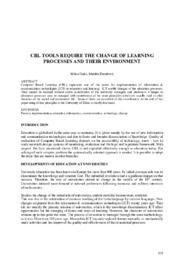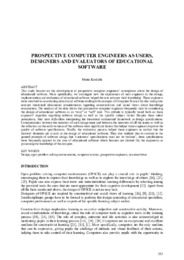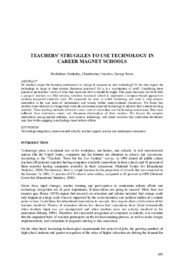CBLIS Conference Proceedings 2003 Volume I: New Technologies and their applications in education: Recent submissions
Now showing items 41-60 of 120
-
Development of children’s investigative skills through collaboration at a distance between two elementary schools in cyprus
(Department of Educational Sciences, University of Cyprus, 2003)The introduction of new educational technologies in elementary schools constitutes a decisive factor for the preparation of tomorrow's citizens, who will be called upon to respond to the challenges of the newly emerging ... -
How to evaluate science problem solving in a computerized learning environment? Construction of an analyzing scheme
(Department of Educational Sciences, University of Cyprus, 2003)This paper describes the construction of a ‘computerized science problem solving’ scheme, which enables analysis and evaluation of the effectiveness of science problem-solving by junior high-school students working in a ... -
Virtual field trips in science: why students Would rather take them than leave them
(Department of Educational Sciences, University of Cyprus, 2003)Virtual Field trips open new possibilities for instructional designers to create more interactive worlds for learners. However is the interactivity afforded by such desktop systems for users sufficient for learners to feel ... -
Taking an electronic mathematics examination from home: what the students think
(Department of Educational Sciences, University of Cyprus, 2003)The Open University’s Science department produced a short course in Mathematics. Its aim was to assist science undergraduates in obtaining the key skills required in order to progress through higher level science modules. ... -
Designing a task for expressing randomness
(Department of Educational Sciences, University of Cyprus, 2003)This paper describes how children express their ideas for randomness in a two-dimensional continuous space, through tools for directing and redirecting the simulated movement of bouncing and not bouncing balls. The paper ... -
The use of information and communication technology in mathematics - a double irony?
(Department of Educational Sciences, University of Cyprus, 2003)When the microcomputer was introduced to schools in the late 1970’s the connection between it and mathematics seemed more than obvious. Educators would have been excused if they thought that technology (and the computer ... -
Metabook. Evaluating the possibilities of e-books in schools
(Department of Educational Sciences, University of Cyprus, 2003)The objective of METABOOK project is to investigate the possibilities of e-books in the classroom and in the education field in general, as a possible replacement of traditional “paper books”, in order to minimize the cost ... -
Open distance inter-university synergies Between Εurope, Αfrica and the middle east (odiseame)
(Department of Educational Sciences, University of Cyprus, 2003)The challenge facing new technologies is whether they can contribute to a qualitative step up and to education for all as a process of facilitating the development of creative people with the ability to think critically ... -
The electronic systems for education of students (the basic problems with the implementation)
(Department of Educational Sciences, University of Cyprus, 2003)The education is process of passing the knowledge from the teacher to the student. The information technology could facilitate this process. The author is interested in the problem of implementation the Internet coursewares ... -
The evolving use of information technology in a large canadian high school – what’s working and what’s not
(Department of Educational Sciences, University of Cyprus, 2003)This presentation provides an update on the evolving use of information technology (IT) in the classrooms of a large Canadian high school. The discussion concentrates on IT developments in the mathematics and science ... -
Perc: a departmental solution for web-enhanced courses
(Department of Educational Sciences, University of Cyprus, 2003)Since the Fall of 1998, the department of Physics and Astronomy at Mississippi State University has been using and developing PERC (Providing Electronic Resources for Courses), a set of utilities that can be used to ... -
Webtop: web-based interactive 3d optics and Waves simulations
(Department of Educational Sciences, University of Cyprus, 2003)WebTOP is a three-dimensional, interactive computer graphics system developed at Mississippi State University to help students learn about optics and waves. It has been used to help teach undergraduate introductory physics ... -
Applications of visual knowledge representation in instruction models
(Department of Educational Sciences, University of Cyprus, 2003)One of the objectives of instruction process is to transfer knowledge from teachers to learners, and this knowledge has to be interpreted, to be clear and to be retained from learners. Taking in consideration one of the ... -
Virtual fetal pig dissection as an agent of Knowledge acquisition for female high school Biology students
(Department of Educational Sciences, University of Cyprus, 2003)This study attempted to determine if a virtual fetal pig dissection can be used as a viable alternative for an actual dissection for females enrolled in high school biology classes by comparing the knowledge acquisition ... -
Using technology in early childhood education: the 100 days of school project
(Department of Educational Sciences, University of Cyprus, 2003)This study has three primary objectives. First, it describes the ways in which six teachers in an urban school environment in New York City integrated technology within a common and familiar theme among lower grade students, ... -
Moving from local to global teaching: integrating appropriate technologies – a reflection
(Department of Educational Sciences, University of Cyprus, 2003)There are many reasons why universities and other tertiary education institutes are moving away from providing local (or face-to-face) teaching to global teaching. Our School of Computer and Information Science is one that ... -
CBL tools require the change of learning processes and their environment
(Department of Educational Sciences, University of Cyprus, 2003)Computer Based Learning (CBL) represents one of the terms for implementation of information & communication technologies (ICT) in education and learning. ICT enable changes of the education processes. They cannot be realized ... -
Simulations, applets and learning in schools
(Department of Educational Sciences, University of Cyprus, 2003)This paper reviews the problem of establishing learning effects with computer simulation packages in science teaching. It is stated that evidence is accumulating about the effects of simulations in a laboratory environment ... -
Prospective computer engineers as users, designers and evaluators of educational software
(Department of Educational Sciences, University of Cyprus, 2003)This study focuses on the development of prospective computer engineers’ conceptions about the design of educational software. More specifically, we investigate how the experiences of such engineers in the design, ... -
Teachers’ struggles to use technology in career magnet schools
(Department of Educational Sciences, University of Cyprus, 2003)Do teachers expect the learning environment to change in response to new technology? Or do they expect the technology to adapt to their routine classroom practices? Or is it a combination of both? Underlying these questions ...

